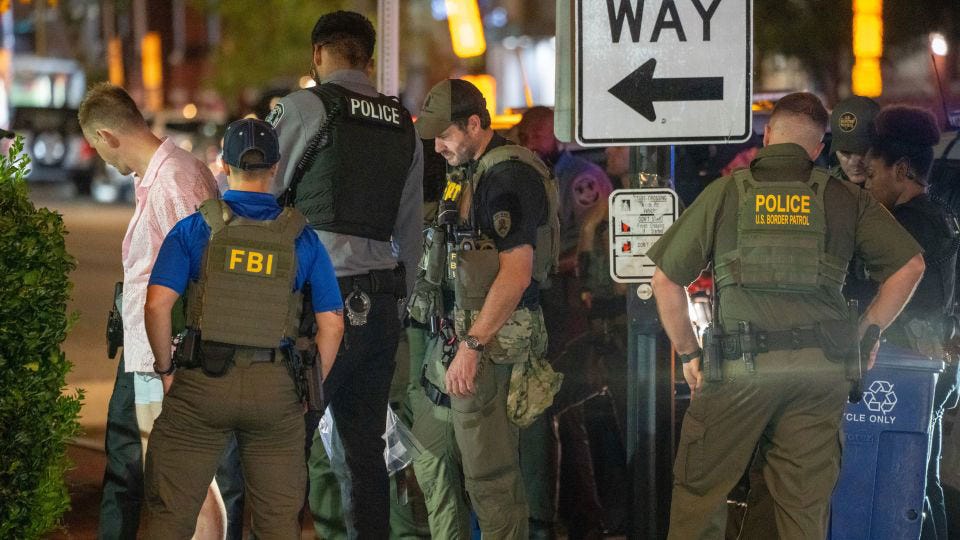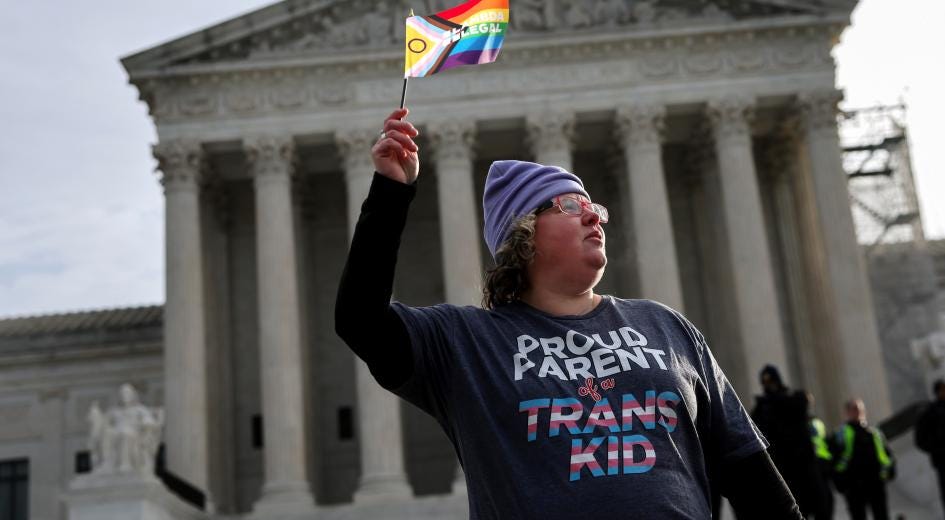Welcome back to the Ledger, a weekly rundown of news and analysis from this week in constitutional law. Below are ten of the top headlines from the week packed together with a handful of articles and a few scholarly papers for those with extra reading time. Please share this recap with anyone interested in constitutional law!
If you are interested in reading my weekly articles that release each Friday, consider upgrading to the paid tier:
Thanks! Now, let’s dive in.

News Desk - This Week’s Top Ten Headlines
Washington, D.C. Faces Federal Crackdown on Crime
On Monday, President Trump signed an Executive Order invoking the Home Rule Act’s provisions for “special conditions of an emergency nature," which Congress passed under the Enclave Clause of the Constitution in 1973. This has prompted protests, at least one lawsuit, a Steve Vladeck post, and an arrest over a sandwich.Petition for Certiorari Asks Supreme Court to Reconsider Gay Marriage
Kim Davis, a local official who refused to certify same-sex marriages, has filed a petition asking the Supreme Court to hear her case and overturn “Obergefell v. Hodges . . . and the legal fiction of substantive due process.” With only one Justice explicitly willing to consider this, there was a remarkable number of headlines over a case with less than a 0.6% chance of going anywhere. The Court will consider it at next month’s conference.Free Speech Challenge to DEI Ban Fails in Appeals Court
A federal judge in Alabama declined to block a state banning diversity, equity, and inclusion (DEI) programs in public schools. Students and professors have challenged the law, arguing it violates First Amendment rights. Their lawsuit will continue, but without an injunction, allowing the law to take effect in October.Trump Administration Ordered to Restore Public Access to Database . . .
The D.C. Circuit unanimously ruled last Sunday that the administration must restore public access to the "Public Apportionment Database," which tracks federal spending of congressionally appropriated funds. The judges rejected an argument that public disclosure violates executive power, instead holding that Congress holds "plenary power" over appropriations under Article I. The court ordered the database to be reinstated.. . . While DOGE May Access Requested Data
Two days later, the 4th Circuit held that an attempt from the Department of Government Efficiency (DOGE) to access federal data held by the Treasury Department, Office of Personnel Management, and Department of Education cannot be challenged by a group of unions and teachers associations. An injunction from March had blocked access to the data under privacy and administrative laws. The circuit court held that the challengers “failed, by a decent margin, to show that they will likely prevail on all of these issues combined,” and therefore their claims did not warrant a preliminary injunction.Second Circuit Rules Against New York Cannabis Law
Also on Tuesday, the Second Circuit held that the New York Office of Cannabis Management and state Cannabis Control Board ran afoul of the Dormant Commerce Clause by prioritizing cannabis licenses for in-state applicants over their neighboring counterparts. This marks the second time that a federal court has applied the Dormant Commerce Clause to the cannabis industry. If this line of cases continues, national cannabis companies may expand their operations into states with stricter drug laws, causing a ripple effect that may run headlong into recent Supreme Court’s leanings.Native American Church’s Religious Exercise Claims Rejected
The Fifth Circuit held that the City of San Antonio’s proposed development plan, which includes tree removal and bird deterrence, did not “substantially burden” the religious exercise of a Native American Church. The court said the plan served public health and safety, using least restrictive means to advance its goals.Christian Volunteer’s Religious Prison Program Reinstated On Thursday, the Eighth Circuit reversed a district court's decision against Anthony Schmitt, a Christian volunteer who taught a program called “The Quest for Authentic Manhood” at a Minnesota prison for eight years. The program was discontinued in 2023 by the state department of corrections due to its conflict with the department’s commitment to DEI views on masculinity, sexual orientation, and gender. The court found the termination targeted Schmitt’s religious viewpoint and likely violated his First Amendment rights.
Louisiana’s Racial Gerrymanders Addressed in Lower Court On Also on Thursday, the Fifth Circuit upheld a ruling that Louisiana’s redrawn state legislative district maps violate Section 2 of the Voting Rights Act by diluting Black voters’ ability to form effective voting blocs. Voters sued in 2022, claiming the maps “cracked or packed” Black populations to weaken their electoral power. Affirming that the maps were discriminatory based on a thorough review of factors the court required Louisiana to redraw its maps to ensure fair representation. Racial gerrymandering and the Voting Rights Act were the topics of my last article, which you can read here.
Lower Courts Continue to Apply Skrmetti and Uphold State Gender Laws
The Eighth Circuit Court of Appeals held Arkansas’s ban on gender transition treatments for minors is constitutionally permissable. As covered by last week’s newsletter, this case applies the Supreme Court’s recent landmark decision in United States v. Skrmetti. This week’s article will break down Skrmetti’s main points and explore some interesting implications.

Picks of the Week - Articles Worth Your Time
Nonsense and Sense About Supreme Court Interim Orders
Source: Executive Functions | Author: Jack Goldsmith | Link
A critique of a recent New York Times op-ed accusing the Supreme Court of partisan allying with Trump. The excellent Prof. Goldsmith breaks down how this narrative is misinforming and weak.
The perils of using class actions as a replacement for universal injunctions
Source: SCOTUSBlog | Authors: Brian Fitzpatrick | Link
Analyzes the recent decision in Trump v. CASA, and the proper use of class action lawsuits as an alternative to universal injunctions. Echoing Justice Alito’s concurrence in CASA, Prof. Fitzpatrick raises concerns over the lingering problems in swapping injunctions for class actions.
Religious Hiring and Church Autonomy
Source: NCLA Blog | Author: Kara Rollins | Link
Examines the modern phenomena of the “pen and phone” approach to executive power.
Papers and Research - Serious Scholarly Stuff
The End of Administrative Pragmatism?
Authors: Andrew Hammond & Christopher Walker
Examines the Supreme Court’s shift towards an anti-administrativist stance and Justice Kagan’s pragmatic approach. Check it out here.
Justifying the Fourth Amendment
Author: Daniel Epps
A critically sharp examination of answers to a seemingly simple question: “Why does the Fourth Amendment belong in the Constitution?” Read here.
How Originalism Became “Our Law.” And Why That Matters.
Author: Elias Neibart
A timely call “to appreciate originalism’s precariousness” as the default constitutional methodology. Calls for originalists to embrace the reasons the theory becam popular to begin with. Read here.
That’s a wrap! Be sure to comment with any thoughts, and I’ll see you Friday!
Thank you for reading.
In liberty,
Ethan Savka




